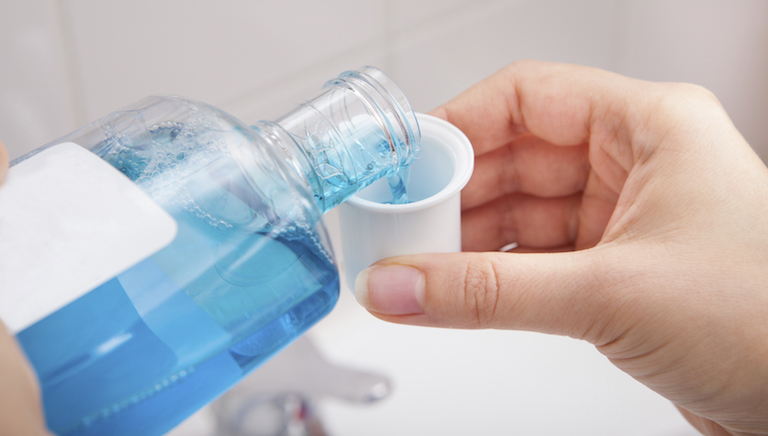The debate as to the effectiveness and indeed the overall purpose of mouthwash has been raging worldwide for some time. To such an extent that most dentists are asked by their patients on a daily basis as to whether or not they should be using mouthwash at all.
As for the truth…well, as is the case with most things, it isn’t quite so simple. For the most part, dentists do indeed recommend using mouthwash on a daily basis. However, when it comes to the various types of mouthwash available and how they are used, opinions and advice vary significantly.
One of the primary concerns among critics being the way in which mouthwash has the potential to mask the evidence of various dental health problems, though may not necessarily do anything about them. That is, unless the mouthwash in question is specifically designed to address this specific problem.
What’s important to understand about mouthwash is the way in which there are huge differences between cosmetic and therapeutic products. For example, the best mouthwash for gum disease may be entirely different from the best mouthwash for bad breath. More often than not, experts advise patients to speak to their dentists for professional advice, before getting started with any kind of mouthwash across the board.
Cosmetic Mouthwash
First of all, these are the types of mouthwash products that can be picked up from supermarkets, pharmacies and just about anywhere else. They often contain a range of compounds which can help kill bacteria, protect the teeth and also temporarily address bad breath. Many cosmetic mouthwash products also contain fluoride, which is of course great for reducing the risk of tooth decay and cavities. The risk of gum disease can also be reduced significantly by quality cosmetic mouthwash, while some also claim to have the ability to contribute to whiter teeth. However, the vast majority of cosmetic mouthwash products are designed to be relatively modest in terms of strength and their resulting therapeutic properties.

Therapeutic Mouthwash
By contrast, these are the mouthwashes that are prescribed or provided by dentists and doctors, which contain various targeted ingredients for common oral health conditions. They have a tendency to be much stronger than their cosmetic counterparts and are usually recommended for use sparingly on a temporary basis only. This is precisely why it is highly advisable to speak to your dentist with regard to their own recommendations, given the way in which most therapeutic mouthwash products cannot be sold OTC.
Supplementary Benefits
One of the most important rules when it comes to everyday oral health is that of remembering that no mouthwash can substitute for a healthy regime of brushing and flossing. In fact, no element of your everyday oral health regime should be used to substitute any other. It’s when all the contributory elements are brought together that the total effect can be achieved. That said, the quality of the products you use and the way in which you use them will also have an impact.
A Few Facts and Fables
As for making sense of all the various myths and mysteries about mouthwash currently doing the rounds online, it’s wise to only ever seek advice from a source you can trust. That being, your dentist. But just to help clarify a few of the basics, what follows is a brief overview of just a few of the most common mouthwash talking points and debates right now:
- Mouthwash and oral cancer
First of all, millions of people all over the world now refuse to use mouthwash that contains alcohol, given the way in which alcohol in general has been linked with various oral cancers. In reality however, the most extensive review to date which appears in the Journal of the American Dental Association states quite clearly that there is insufficient evidence to suggest that any kind of mouthwash is in any way linked with cancer. It’s simply a case of circumstantial and anecdotal evidence having been read into a little too deeply. - Alcohol or no alcohol?
That said, various studies into the effects of mouthwash have also found that products that contain no alcohol whatsoever can work just as well as those with high concentrations of alcohol. And given the fact that alcohol can leave the mouth feeling somewhat dry and sensitive, it’s easy to see why many dentists recommend alcohol-free mouthwash. - Mouthwash can’t kill germs that cause colds
While it’s true to say that antiseptic mouthwash can do a good job killing germs and bacteria, they unfortunately don’t offer any level of treatment or protection against the common cold. It’s a common myth that the stronger the mouthwash and the more regularly to use it, the better your protection from year-round colds. In reality, the theory was entirely ousted all the way back in 1978. - Mouthwash is not a replacement for flossing
We’ve mentioned it once but it bears repeating – mouthwash cannot and should not be viewed as a replacement for flossing. Right up until the mid-2000s, a number of mouthwash manufacturers claimed in their marketing materials that their products were just as effective as flossing. Unfortunately, on the back of scientific evidence, they were ordered to cease and desist immediately – given that they were completely wrong! - Before or after?Last but not least, some believe that to use mouthwash after brushing is to effectively rinse the mouth clean of all the good stuff left behind by the toothpaste. By contrast, others believe that by using mouthwash before brushing, you then go and eliminate 99% of it when you go ahead and brush normally. There’s logic to both arguments and it’s a subject that is definitely worth discussing. Though as far as most experts are concerned, it really doesn’t matter when you use it – just as long as you do!
